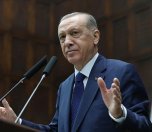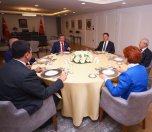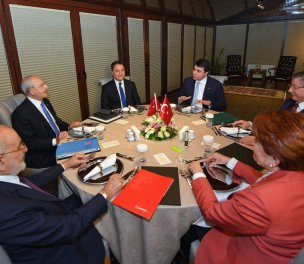The six opposition parties, known as the "Table of Six," have released a memorandum of understanding, outlining the policies they will pursue if they win the elections.
The 244-page document explains the bloc's goals and policies in nine sections: law, public administration, anti-corruption, economy, sectoral policies, education, social policies, foreign policy and security and migration.
The program was unveiled at a ceremony yesterday (January 30) in Ankara, the capital, with a deputy chair from each party explaining a part of the document.
CLICK - Full text of the document
"As the six political parties representing our nation in the widest spectrum, we have reached a new stage in the joint work ... to overcome the deepest administrative and economic crisis in the history of the Republic," the Republican People's Party (CHP), the leading party of the bloc, said in a statement.
For nearly a year now, the six parties, including two splinter movements from President Recep Tayyip Erdoğan's ruling party, have been holding round table meetings to lay out a roadmap for the country's post-election future.
The candidate
While they have yet to announce a joint candidate, the leaders have agreed on several key issues, including a return to a parliamentary system and orthodox economic policies.
Previously, CHP leader Kemal Kılıçdaroğlu said they might announce their candidate after February 13. Kılıçdaroğlu is expected to become the opposition's candidate, especially after the sentencing of İstanbul Mayor Ekrem İmamoğlu, a CHP member who managed to end the ruling party and its predecessors' 25-year rule in the metropolis.
The elections are scheduled for June 18, but recently, the president said multiple times that they will be brought forward to May 14.
The bloc also aims to revitalize Türkiye's European Union accession process and return to the F-35 fighter jet program, from which it was kicked out because of buying missile systems from Russia.
The document makes no mention of LGBTI+s and Kurds' demands for fundamental rights.
The Table of SixThe six-party bloc comprises the main opposition Republican People's Party (CHP), the İYİ (Good) Party, the Democracy and Progress (DEVA) Party, the Gelecek (Future) Party, the Saadet (Felicity) Party and the Democratic Party (DP). Leaders of the parties had their first round table meeting on February 22, 2022, to address the country's problems and discuss solutions. On February 28, they signed a memorandum of understanding to switch to what they called an "enforced parliamentary system" after the elections. Such a change would require the opposition bloc to have a three-fifth majority in the parliament, which is not likely according to election polls. The DEVA Party, led by former deputy PM Ali Babacan, and the Gelecek Party, led by former PM Ahmet Davutoğlu, are the two splinter movements from the Justice and Development Party (AKP). The Saadet Party also shares the same Islamic roots with the AKP, which has been in power for over 20 years. The four parties other than the CHP and the İYİ Party have no significant popular support, with their voting rates below 3 percent, according to most election polls. However, their support may prove crucial in what is anticipated to be a close race. |
Women and the İstanbul Convention
While the leaders vowed to improve women's rights in the country, the document makes no mention of the İstanbul Convention, a Council of Europe treaty for combating violence against women, from which Türkiye pulled out in 2021.
However, the document says only the parliament will be authorized to withdraw the country from international agreements, apparently referring to Türkiye's withdrawal from the convention by a presidential decree.
While the documents make no mention of LGBTI+ rights, either, it addresses some longstanding demands of women's groups.
Türkiye will comply with the rules of the Lanzarote Convention, another Council of Europe treaty for the protection of children against sexual abuse, said the bloc.
The Ministry of Family and Social Services will be restructured as the "Ministry of Women, Family and Children" and a campaign to combat violence against women will be launched, according to the program.
Taxes will be lowered for women's hygiene products, all working women will be granted administrative leave on March 8 Women's Day, the leaders further promised.
Migration
Under the rule of the six-party alliance, Türkiye will not be treated as a "buffer country" for refugees and asylum seekers said the bloc.
Türkiye will make readmission agreements with source countries of immigration and fortify its border with high-tech equipment, the document said.
Foreign citizens will no longer be able to obtain citizenship of Türkiye by purchasing real estate, and "ghettoization" of neighborhoods will be prevented, it further noted.
The document makes no mention of sending millions of refugees back to Syria, which was among the promises of CHP leader Kemal Kılıçdaroğlu.
According to official figures, Türkiye hosts over four million refugees, including about 3.7 million people from Syria, more than any other country in the world. (VK)





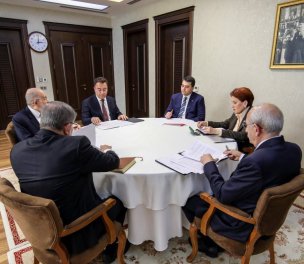
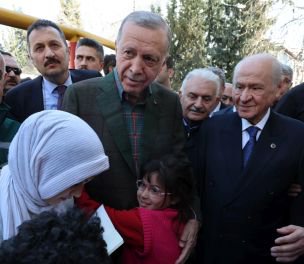
.jpg)
